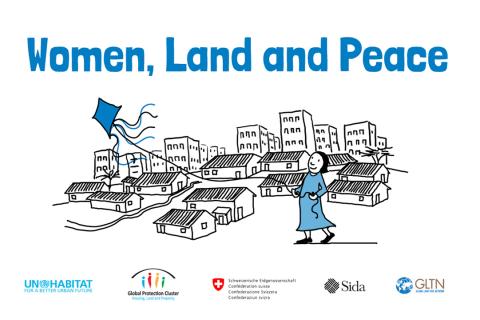Animation on Women, Land and Peace Advocacy
MinAgro rechazó invasiones de tierras y dijo que responsables serían investigados
Desde hace más de dos meses se venían reportando invasiones de predios privados especialmente en el Cauca, comunidades indígenas estaban apoderándose de tierras que hoy son usadas en su mayoría para la agroindustria de la caña. Finalmente el Gobierno rompió el silencio sobre los hechos, y fue la propia ministra de Agricultura, Cecilia López quien detalló que rechazan esos actos y "quienes quieren promover invasiones entorpecen la gestión del Gobierno y esto podría redundar en que sean investigados por parte de las autoridades".
Littérature : « Parcelle à vendre » !
Land reform can only happen by targeting private property ownership
Land reform can only happen by targeting private property ownership, says Tembeka Ngcukaitobi
Government should abandon the policy of land restitution because it is not economically or politically feasible, and rather go back to redistribution.
The concept of private property came about as a result of colonial efforts to disenfranchise African people, advocate Tembeka Ngcukaitobi told people gathered at The Forge’s talks on land in South Africa, scheduled to run throughout the month.
What’s driving up land prices along the fast track?
Main photo:
A recent Nepal Rastra Bank report suggests that property price in Kathmandu Valley is increasing at the rate of 27.7 percent a year, doubling the real estate value every 3.5 years.
In fact, almost every developing area of Nepal is witnessing this phenomenon. Property-price appreciation is starker still in the Madhes province and the Tarai towns of Sudurpaschim province.
Rautahat locals upset with police inaction
Local residents of Gaur, Rautahat, have lamented the failure of police administration to arrest people involved in a plot to capture the land of Gaur Rice Mills, including a government employee who confessed he forged official documents.
Set up in 1946, the mill was closed after 22 years due to various reasons. As the mill could never resume operation, its land was being used as playground and programme venue for political parties and other organisations.
China Land Sales Remain Sluggish Even as Bidding Rules Eased
China’s cash-strapped developers have become reluctant to acquire land even as some local governments relax bidding rules, adding to signs of their liquidity crunch and threatening to deepen the nation’s economic slowdown.
Land plots auctioned in the fourth quarter through Dec. 20 only fetched an average 3% premium over their starting prices, according to data compiled by China Real Estate Information Corp. That’s down from a 17% premium in the second quarter and 8% in the third, said the research agency, which tracks auctions across 300 Chinese cities.
E-learning course on SDG Indicator 1.4.2
This free e-learning course shows how to gather data for Sustainable Development Goal (SDG) indicator 1.4.2, which monitors security of land tenure rights.
The course is aimed at officers of national statistics organizations, land registries among others, responsible for collecting and reporting official national data on land tenure security, as well as other stakeholders involved in monitoring of land governance and tenure security.
Real estate industry of Pakistan: Land lords vs state lords
According to Prof Abdul Shakoor Shah, Pakistan is the most urbanized nation in South Asia. The Real Estate industry in Pakistan was instigated from Karachi. It subsisted even before partition. Property tycoons constructed buildings but the selling of plots was atypical. The industry started progressing in the 1950s and DHA came into being.
Land ownership in South Africa remains a contentious issue — while calls for redistribution grow louder
The fundamental redistributive and transformative character of the Constitution — and how politicians, policymakers and legislators have ignored this — was a key thread at the Social Justice Summit and preceding international conference on economic equality and the rule of law hosted by Stellenbosch University Law Trust Chair in Social Justice, Thuli Madonsela.
Afghan women's hard-won land rights seen at risk under Taliban
Aug 25 (Thomson Reuters Foundation) - The Taliban’s return to power threatens Afghan women’s hard-won property rights, with thousands who fled their homes during the militants’ takeover at particular risk of losing their land and houses for good, rights groups and researchers said.
The Taliban imposed a strict Islamic law that largely denied women property rights during its 1996-2001 rule, but since then local authorities have been granting property titles to widows, divorced women and other female-led households.











